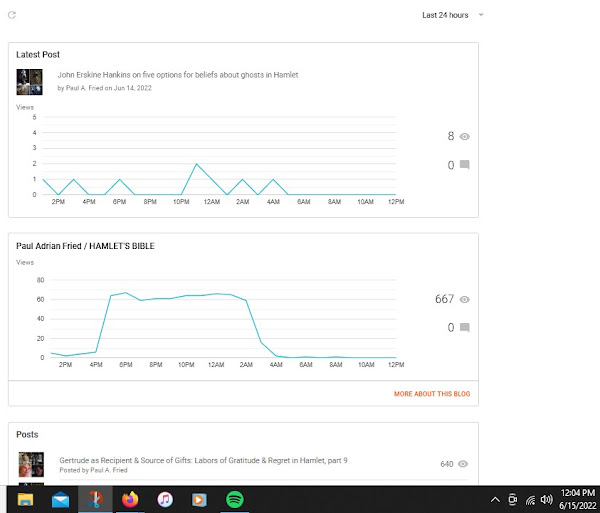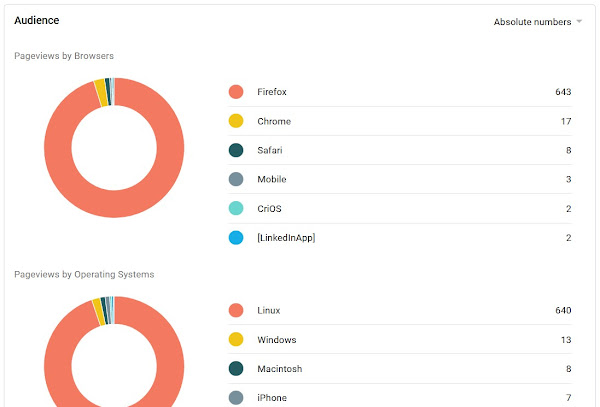Thanks for 640 new readers from Russia
Usually when summer begins, views to my blog fall off as students and instructors take a break at the end of the spring term.
But unexpectedly, in a 12-hour period this past day, I had 640 views of one of my blog posts from October of 2019 called "Gertrude as Recipient and Source of Gifts." This was part 9 in a multi-part series on "Labors of Gratitude and Regret in Hamlet exploring how interactions between characters either offered (non-material) gifts that might inspire them to change, or how interactions sometimes moved characters to regret and change. (If you have not yet read that post, please feel free to visit the blog and give it a read at this link:
https://pauladrianfried.blogspot.com/2019/10/gertrude-as-recipient-giver-of-gifts.html
Here is a screen shot of the increased views over the last 24 hours associated with that post: When there is a surge in views like that, it might be caused by an instructor who teaches multiple sections of a class whose students have all been assigned a particular reading. (At times it seems I have certain posts that may generate views for similar reasons, but on a smaller scale, perhaps a single instructor with a single section of a class, assigning one of my posts as reading?)
The blog's analytics identify that the views of this post on Gertrude in the 24-hour period were from Russia:
As we know, Russia is at war with Ukraine, and the US has been using NATO as a tool to place various pressures on Russia. The war is tragic, as all wars are, and the US use of NATO expansion at Russia's borders is concerning.
But literature instructors and students have little choice in their country's foreign policies or military decisions, so I welcome the interest and new readers.
The blog's analytics also show that most of these readers from Russia use Firefox as their browser (as I do at times), and Linux as their operating system (I have used Linux for years as one among other operating systems). Interesting to note that we have these things in common. Just five days ago was the 59th anniversary of John F. Kennedy's commencement speech at American University (June 10, 1963). The speech came after the Cuban Missile Crisis the previous October (16-28, 1962). In that speech, he made a number of helpful statements. His remarks remind me that we have more in common than Firefox and Linux:
Among the many traits the peoples of our two countries have in common, none is stronger than our mutual abhorrence of war. Almost unique among the major world powers, we have never been at war with each other. And no nation in the history of battle ever suffered more than the Soviet Union suffered in the course of the Second World War. At least 20 million lost their lives. Countless millions of homes and farms were burned or sacked. A third of the nation's territory, including nearly two thirds of its industrial base, was turned into a wasteland--a loss equivalent to the devastation of this country east of Chicago.
[...]
So, let us not be blind to our differences--but let us also direct attention to our common interests and to the means by which those differences can be resolved. And if we cannot end now our differences, at least we can help make the world safe for diversity. For, in the final analysis, our most basic common link is that we all inhabit this small planet. We all breathe the same air. We all cherish our children's future. And we are all mortal.
In that spirit, I am most grateful for the new readers and our shared interests.
~~~~~~~~~~~~~~~~~~~~~~~~~~~~~~~~~~~~~~
My current project is a book tentatively titled Hamlet’s Bible, about biblical allusions and plot echoes in Hamlet.
Below is a link to a list of some of my top posts (“greatest hits”), including a description of my book project (last item on the list):
https://pauladrianfried.blogspot.com/2019/12/top-20-hamlet-bible-posts.html
I post every week, so please visit as often as you like and consider subscribing.

But unexpectedly, in a 12-hour period this past day, I had 640 views of one of my blog posts from October of 2019 called "Gertrude as Recipient and Source of Gifts." This was part 9 in a multi-part series on "Labors of Gratitude and Regret in Hamlet exploring how interactions between characters either offered (non-material) gifts that might inspire them to change, or how interactions sometimes moved characters to regret and change. (If you have not yet read that post, please feel free to visit the blog and give it a read at this link:
https://pauladrianfried.blogspot.com/2019/10/gertrude-as-recipient-giver-of-gifts.html
Here is a screen shot of the increased views over the last 24 hours associated with that post: When there is a surge in views like that, it might be caused by an instructor who teaches multiple sections of a class whose students have all been assigned a particular reading. (At times it seems I have certain posts that may generate views for similar reasons, but on a smaller scale, perhaps a single instructor with a single section of a class, assigning one of my posts as reading?)
The blog's analytics identify that the views of this post on Gertrude in the 24-hour period were from Russia:
As we know, Russia is at war with Ukraine, and the US has been using NATO as a tool to place various pressures on Russia. The war is tragic, as all wars are, and the US use of NATO expansion at Russia's borders is concerning.
But literature instructors and students have little choice in their country's foreign policies or military decisions, so I welcome the interest and new readers.
The blog's analytics also show that most of these readers from Russia use Firefox as their browser (as I do at times), and Linux as their operating system (I have used Linux for years as one among other operating systems). Interesting to note that we have these things in common. Just five days ago was the 59th anniversary of John F. Kennedy's commencement speech at American University (June 10, 1963). The speech came after the Cuban Missile Crisis the previous October (16-28, 1962). In that speech, he made a number of helpful statements. His remarks remind me that we have more in common than Firefox and Linux:
Among the many traits the peoples of our two countries have in common, none is stronger than our mutual abhorrence of war. Almost unique among the major world powers, we have never been at war with each other. And no nation in the history of battle ever suffered more than the Soviet Union suffered in the course of the Second World War. At least 20 million lost their lives. Countless millions of homes and farms were burned or sacked. A third of the nation's territory, including nearly two thirds of its industrial base, was turned into a wasteland--a loss equivalent to the devastation of this country east of Chicago.
[...]
So, let us not be blind to our differences--but let us also direct attention to our common interests and to the means by which those differences can be resolved. And if we cannot end now our differences, at least we can help make the world safe for diversity. For, in the final analysis, our most basic common link is that we all inhabit this small planet. We all breathe the same air. We all cherish our children's future. And we are all mortal.
In that spirit, I am most grateful for the new readers and our shared interests.
~~~~~~~~~~~~~~~~~~~~~~~~~~~~~~~~~~~~~~
My current project is a book tentatively titled Hamlet’s Bible, about biblical allusions and plot echoes in Hamlet.
Below is a link to a list of some of my top posts (“greatest hits”), including a description of my book project (last item on the list):
https://pauladrianfried.blogspot.com/2019/12/top-20-hamlet-bible-posts.html
I post every week, so please visit as often as you like and consider subscribing.




Comments
Post a Comment